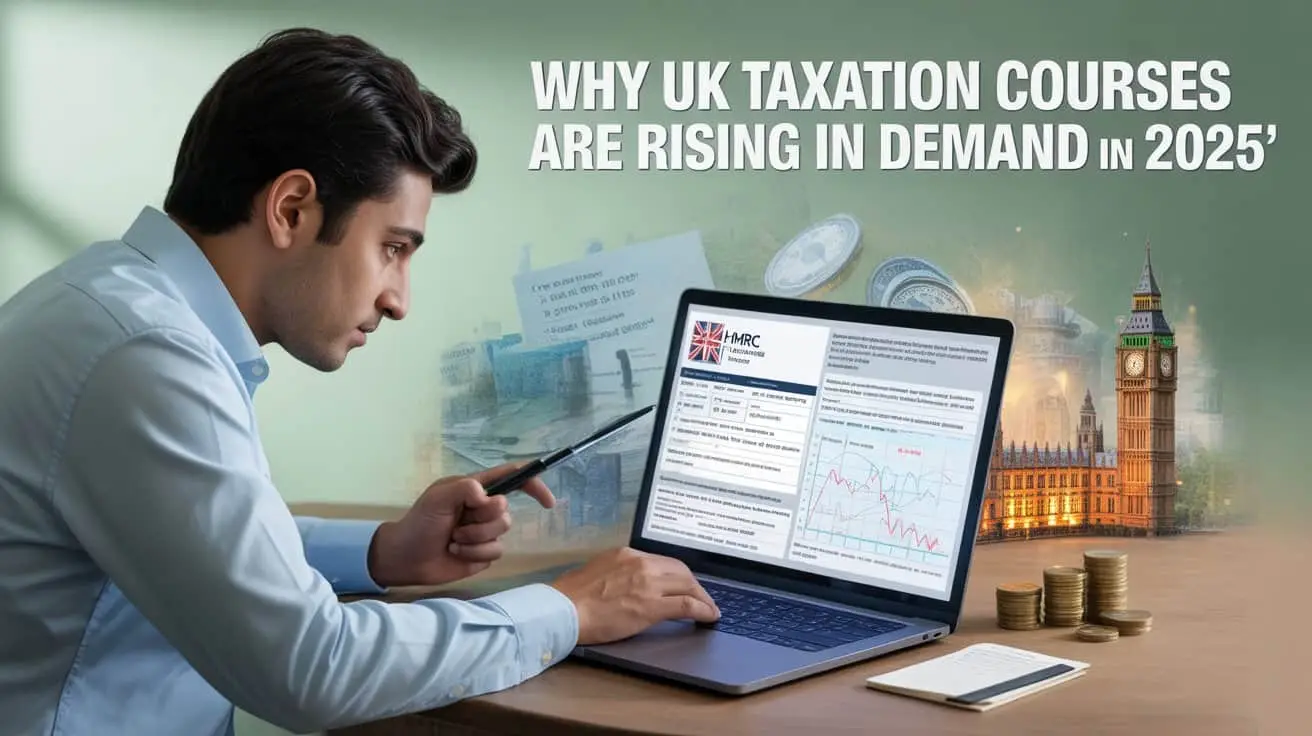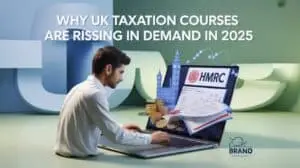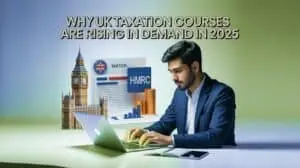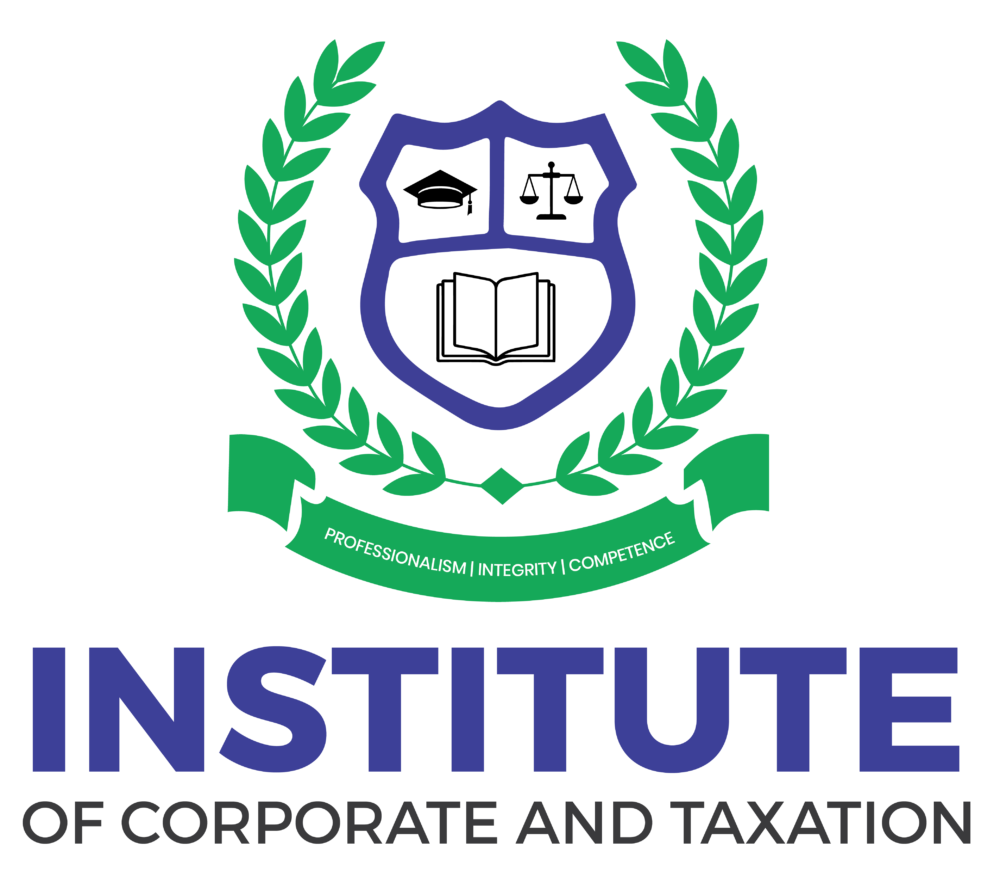
Why UK Taxation Courses Are Rising in Demand in 2025
Introduction – The Growing Importance of UK Tax Knowledge
The economy of the UK remains a driving force for global finance, and London continues to be among the world’s leading financial centers. As we move through 2025, the need for tax experts has never been greater, opening unprecedented opportunities for Pakistani professionals and students seeking to establish careers in UK taxation and accounting.
Recent statistics from the UK Office for National Statistics indicate that the accounting and tax industry has seen a 12% increase in vacancies within the last 12 months alone. This trend is not simply about figures—it’s a paradigm shift in the way UK companies go about sourcing global talent. For Pakistani professionals, this means tangible opportunities, either through on-site employment in the UK or in increasingly sought-after remote work arrangements.
The changing UK tax environment, especially with the full effect of Making Tax Digital (MTD) and post-Brexit regulation, has established a pressing demand for professionals who have expertise in both conventional tax concepts and contemporary digital compliance systems. It is where specialized courses in UK taxation become not only worthwhile, but indispensable to career progress.
Understanding UK Taxation – What You Need to Know
Overview of UK Tax System (Income Tax, Corporation Tax, VAT)
The UK tax regime is based on an overall system that has three main areas. The income tax has a progressive rate with a 20% to 45% range, based on earning levels. Knowing these levels and the different allowances one can take advantage of is very important for any taxation specialist dealing with UK clients.
Corporation tax at 19% for small businesses and 25% for large businesses demands in-depth knowledge of profit computation, permissible deductions, and relief arrangements. The technicality grows when handling group structures, cross-border dealings, and R&D tax reliefs—domains where expert professionals draw top-of-the-line remunerations.
Value Added Tax (VAT) has a standard rate of 20% while there are reduced rates on certain goods and services. The actual challenge is VAT schemes, registration limits, and the complicated rules of international trade, particularly in the post-Brexit scenario. Pakistani experts who are well-versed with these concepts are in great demand by UK companies dealing with cross-border transactions.
Role of Tax Professionals in the UK
Tax experts in the UK are key intermediaries between HMRC and businesses. Their role goes well beyond mere tax return preparation. They are strategic counsel who advise businesses on how to maximize their tax positions while ensuring complete tax compliance with ever more complicated rules.
The contemporary UK tax professional has to balance technical skills with effective communication skills. They interpret tax laws, offer planning guidance, deal with HMRC enquiries, and more and more often, walk clients through digital transformation projects. This versatility is the reason why qualified tax experts can earn beginning salaries of £25,000-£35,000 and skilled professionals much higher.
Skills Employers Look for (Accounting, Compliance, Software)
UK employers look for a certain combination of skills that exceed book knowledge. There is a technical accounting competence base, but expertise in compliance processes and software systems is just as desirable. Employers especially need people who understand how to use HMRC’s online tools, Real Time Information (RTI) filing, and making tax digital obligations.

Software skills are no longer negotiable. Expertise in applications such as Xero, QuickBooks, Sage, and niche tools such as TaxCalc or IRIS distinguishes candidates. Pakistani professionals who blend UK tax expertise with these skills tend to be highly sought after remote candidates, as they are able to offer both prowess and value-for-money to UK companies.
Why UK Taxation Courses Are in High Demand in 2025
Global Outsourcing of Tax Work to Pakistan & India
The outsourcing phenomenon has picked up steam in 2025, with British accounting firms further discovering the worth of Pakistani tax professionals. It’s not just about cutting costs—it’s about tapping a talent pool of highly educated, English-speaking professionals who can provide quality output time zones apart. Large UK firms now have specialized staff working in Pakistan, doing anything from routine bookkeeping to sophisticated tax planning.
This outsourcing boom has set an unusual precedent whereby Pakistani professionals can command competitive pay without leaving their home offices, earning 3-4 times the prevailing local market rate. The secret? Formal UK tax certification that proves proficiency in UK-specific laws and procedures.
Remote Work Opportunities for UK Accounting Firms
The revolution in remote work has irrevocably shifted the job market. UK companies, which used to demand physical presence in the office, now openly hire remote tax experts from all over the world. For Pakistani job seekers holding UK tax certifications, this translates into opportunities that were once geographically limited.
These remote roles range from beginner’s tax assistant posts earning £18,000-£22,000 per year to leadership positions earning £40,000+. Both ways the flexibility works—experts can serve from Pakistan keeping UK working hours, or go for asynchronous arrangements that are optimized for productivity across time zones.
Growing Demand for Qualified Tax Assistants & Accountants
The surge in demand isn’t short-term—it is indicative of structural shifts within the UK tax profession. A graying workforce, with older tax professionals reaching retirement age, meets rising regulatory sophistication to create long-term demand for fresh talent. According to the Association of Chartered Certified Accountants (ACCA), UK practices will require around 50,000 new tax professionals over the next five years.
For professionals and Pakistani students, this is a golden opportunity. Anyone investing in UK tax education today sets themselves up for career development for decades to come. The career progression from tax assistant to senior tax manager or partner is well defined with clear milestones of progression and salary increases.
Digital Tax Transformation (Making Tax Digital – MTD)
Making Tax Digital is the UK’s biggest tax administration change in decades. The digital record-keeping and quarterly reporting requirement has generated humongous demand for professionals who are familiar with conventional tax concepts and digital application. Pakistani experts who learn to handle MTD requirements find themselves at an advantage, as numerous UK companies struggle to fill slots with candidates possessing this mixed skill set.
The MTD rollout to corporation tax and ultimately all businesses equates to this not being a flash-in-the-pan trend but a seismic shift needing constant expertise. Experts who have UK tax experience alongside digital skills charge premium fees, either working remotely or moving to the UK.
Best UK Taxation Courses for Pakistanis in 2025
ACCA UK Taxation Module
ACCA’s UK Taxation paper is still the benchmark for full-tax education. All areas of UK taxation, from personal income tax to intricate company structures, are covered in this module. The fact that ACCA is widely recognized globally and offers a well-established route to finding employment in the UK makes it especially useful for Pakistani students.
The structure of the course is to balance knowledge with practice, employing real-life situations that reflect real UK tax practice. Students develop skills to compute tax charges, know relief provisions, and operate under HMRC procedures. The status of the qualification is such that ACCA-qualified professionals tend to skip entry-level job opportunities, joining the profession at more senior levels with salary packages accordingly higher.
ATT (Association of Taxation Technicians)
The ATT qualification provides a specialist, work-based route to UK taxation that some employers prefer for technical roles. Compared with more general accounting qualifications, ATT focuses solely on tax, delivering specialists who can be deployed directly into tax departments. The qualification usually takes 2-3 years to complete, with flexible study arrangements appropriate to Pakistani students.
What distinguishes ATT is its focus on real-world tax practice. Graduates are equipped to deal with tax returns, manage compliance dates and deadlines, and assist senior tax advisers with technical advice. The qualification is specifically worth it for those looking for remote jobs, as it proves specialized skills that UK companies cannot find locally.
CTA (Chartered Tax Adviser)
The CTA is the highest UK tax qualification, making the holder a qualified adviser who can tackle the most sophisticated tax issues. More difficult than the ATT, the CTA leads to senior roles and consultancy. CTA holders from Pakistan tend to be hired for specialized positions, with remunerations that compare with UK-based counterparts.
The qualification involves both exams and experience, so the graduates become equipped with theoretical knowledge as well as practical ability. For the ambitious Pakistani professionals, CTA provides a direct route for tax partnership or independent consultancy practice for UK clients.
Practical UK Tax Training Courses (Online + Live Classes)
In addition to academic qualifications, vocational training courses have become popular among Pakistani professionals who wish to join UK tax practice in a hurry. Such courses, for 3-6 months, emphasize skills that can be utilized instantly such as completion of self-assessment returns, dealing with VAT returns, and UK tax software.
Numerous Pakistani institutes currently provide hybrid programs that combine online studies with live virtual classes taught by UK tax professionals. Such courses usually contain employment placement assistance, with some providers having direct contacts with UK firms looking for remote employees. Though not taking the place of formal qualifications, these career-based courses provide a quicker pathway to employment, with students frequently finding work before completing the course.
How to Choose the Right UK Taxation Course
Career Goals: Job in UK vs. Remote Work from Pakistan
Your career goals must guide your educational decisions. If you’re relocating to the UK, professional qualifications such as ACCA or ATT become imperative, as they’re usually visa sponsorship needs. These qualifications also facilitate the entry into UK workplace culture, generating credibility that can speed up career advancement.
For those who opt for work from Pakistan remotely, the calculation is a bit different. While official qualifications are useful, skills and software familiarity tend to matter more to employers. Most successful remote tax professionals blend shorter practical courses with ongoing professional development, developing skills through experience rather than lengthy qualification procedures.
Duration & Cost of Different Courses
Investment in UK tax training also differs widely among choices. ACCA’s UK Taxation module is around PKR 150,000-200,000 comprising registration, study materials, and exam fees. The duration usually lasts 6-12 months of focused study. ATT qualification ranges between PKR 300,000-400,000 for 2-3 years and CTA can be over PKR 500,000 for the full program.
Practical courses provide more straightforward entry points, with extensive programs costing PKR 50,000-100,000. These 3-6 month courses offer quicker returns on investment, as numerous students find jobs that pay back within months. The trick is aligning investment with anticipated returns based on your career horizon and financial resources.
Practical vs. Theoretical Training
The coordination between theoretical and practical insight plays an important role in influencing job opportunities. Theoretical knowledge acts as the building block for long-term professional development, allowing specialists to transition easily as regulations change and deal with sophisticated situations. This is important in advisory positions and higher-level roles.
But practical skills largely decide on-the-job employability. Companies require experts who can work with tax returns right away, oversee compliance deadlines, and operate their software systems. The most effective Pakistani tax professionals integrate both methods, developing theoretical foundations while gaining practical skills by way of hands-on application or internships.
Choosing Between ACCA, ATT, CTA
Every qualification caters to different career goals. ACCA offers general accounting knowledge with tax expertise, which is perfectly suited for one who wants to be versatile in their profession. It’s especially beneficial for someone who may shift between tax and other accounting functions or who can move into senior management.
ATT provides specialized tax knowledge ideal for those serious about tax careers. The practical nature of the qualification makes it perfect for Pakistani professionals seeking technical tax positions in UK companies. It is a quicker route into the tax profession than general accounting qualifications.
CTA is ideal for go-getting professionals aspiring to senior tax advisory jobs. Although demanding high investment of time and money, CTA qualifications attract high-level salaries and provide gateway opportunities to partnership streams. For Pakistani professionals prepared to make this investment, CTA provides the most direct route to tax leadership roles.
Career Opportunities After Completing UK Taxation Training
Entry-Level Roles: Tax Trainee, Assistant Accountant
UK tax training creates instant opportunities in starting-level jobs that are career launch pads. Tax trainee roles generally pay £20,000-£25,000 per annum, with clear career progression to more senior roles. These roles include hands-on experience with UK tax returns, HMRC letters, and client dealing—excellent experience for a career.
Assistant accountant jobs that involve tax work tend to pay a bit higher, from £22,000-£28,000. These jobs combine tax work with general accounting work, giving all-around experience that is good for long-term career development. Professionals from Pakistan who hold these positions are frequently given preference for promotions due to their strong work ethic and technical proficiency.

Remote Jobs for Pakistani Students
The market for remote working has grown immensely for Pakistani tax experts. UK companies recruit actively for roles from tax return preparers (£15,000-£20,000) to high-level tax consultants (£35,000-£45,000). The positions provide the comparative benefit of UK levels of salary with Pakistan’s lower cost of living, providing outstanding financial prospects.
Pakistani professionals first work remotely as freelancers or on projects before continuing their education and building clientele that eventually leads to full-time positions. By working remotely, professionals can serve multiple clients, earning more money than they would with a traditional job while maintaining a healthy work-life balance.
Salary Expectations & Career Growth
Career development within UK taxation takes familiar paths with attendant increases in salary. Tax assistants at £20,000-£25,000 usually move into tax senior roles (£28,000-£35,000) within 2-3 years. Tax managers earn £40,000-£55,000, and senior tax managers and directors may earn over £70,000 a year.
For Pakistani professionals, the figures mean life-altering earnings possibilities. Even basic UK tax salaries, when exchanged in Pakistani rupees, mean outstanding standards of living. Remote workers especially gain since they escape UK living expenses yet receive UK wages. Career progression usually speeds up for committed professionals, with numerous professionals achieving managerial positions within 5-7 years.
Path to Becoming a Chartered Tax Adviser
The route to Chartered Tax Adviser status is the pinnacle career success in UK taxation. The route normally starts with ATT qualification, then experience and subsequent CTA qualification. The route usually takes 5-7 years but ends in being regarded as a tax expert able to deal with the most complicated issues.
Pakistani professionals who become CTA-qualified are in exceptionally high demand. They are able to build independent practices catering to UK clients remotely, join global tax practices, or seek partnership possibilities. CTA qualification also aids UK visa sponsorship, as short-listed tax advisers are featured on shortage occupation lists.
How to Start UK Tax Training from Pakistan
Eligibility Requirements
Begin UK tax education from Pakistan entails fulfilling particular requirements that are qualification-specific. ACCA’s UK Taxation module necessitates passing essential accounting papers or corresponding qualifications. The majority of Pakistani students holding B.Com or BBA degrees fulfill these requirements, although some might need to take foundation courses.
ATT accepts students from a range of academic backgrounds and demands only minimum numeracy and literacy. This opens it up for Pakistani professionals already in other careers wishing to move into tax. CTA demands either ATT qualification or considerable professional experience, which makes it appropriate for established tax careers.
Language skills are important in all qualifications. Although formal IELTS results are not always a prerequisite, good English communication is vital for exam success and ultimately employment. Pakistani students from medium English systems usually have these requirements with them naturally.
Recommended Institutes Offering Online Training
UK tax training tailored to Pakistani students is now available from a number of respectable institutions. The Institute of Corporate and Taxation Islamabad is at the forefront of the field and has made a name for itself as Pakistan’s top international tax education destination. Professionals looking for a wide range of foreign tax knowledge would find this institute excellent as it offers thorough taxation courses not just for the UK but also for the US, UAE, and Saudi Arabia. Students who complete their UK taxation program will be prepared for the workforce thanks to a combination of demanding academic instruction and real-world application.
Strong job placement records and thorough ACCA and practical tax training are offered by SKANS School of Accountancy. With tutors certified in the UK, PAC (Pakistan Academy of Commerce) provides organized ATT preparation.with teachers who are qualified in the UK. The distinctive feature of the Institute of Corporate and taxes is its multi-jurisdictional approach, which exposes students studying UK taxes to various foreign tax systems and greatly increases their marketability to multinational corporations.
Cost & Duration Breakdown
Planning your UK tax education journey is made easier when you are aware of the entire investment needed. The UK Taxation module of ACCA costs PKR 25,000 for registration, PKR 15,000 for a yearly subscription, PKR 35,000 for an exam, and PKR 40,000–60,000 for study materials. With 15 to 20 hours of study per week, the majority of students finish the module in 6 to 12 months.
Including all fees and supplies, ATT qualification costs roughly PKR 100,000–120,000 each year for two to three years. Basic programs for practical training cost PKR 30,000, whereas comprehensive courses that include job placement cost PKR 150,000. Despite upfront cost worries, education is accessible because to the many institutes that provide installment plans.
How to Get Job Placement Assistance
After qualifying, finding a job requires help and strategic planning. Numerous training facilities in Pakistan have connections to UK companies looking for remote employees. Top-performing students frequently have direct placement chances as a result of these agreements. For instance, SKANS claims that 80% of students get placed within three months after finishing their courses.

A key factor in landing a job is professional networking. Connecting with UK employers and recruiters who specialize in remote tax employment has become crucial thanks to LinkedIn. Pakistani tax experts should actively participate in UK tax community material and create compelling profiles that showcase their UK tax credentials.
FAQs – UK Taxation Courses 2025
Which tax course is best in the UK?
The “best” course for you will depend on your present circumstances and professional ambitions. For the majority of Pakistani students, ACCA’s UK Taxation module provides the finest mix of recognition, thorough coverage, and career freedom. It maintains its practical relevance while offering a solid theoretical foundation. However, the ATT qualification gives more specialized experience if your focus is solely on tax careers. Software certificates together with hands-on training courses are frequently the quickest path to income for anyone looking for a job quickly.
How much does the tax course cost in the UK?
The cost of a UK tax course varies greatly depending on the study style and degree of competence. The cost of the ACCA UK Taxation module, including all fees and materials, is roughly £500–£800 (PKR 150,000–240,000). Over the course of the entire program, ATT qualification comes approximately £2,000–£3,000 (PKR 600,000–900,000). The cost of practical courses is between £200 and £1,000 (PKR 60,000 and 300,000). For dedicated students, these expenditures are financially justified because they usually yield positive returns within 6–12 months of employment.
Which course is best for taxation?
The most thorough tax education is offered by ATT and CTA for specialist taxation vocations. This combination creates tax experts who can deal with any tax issue in the UK. However, ACCA’s taxation curriculum combined with hands-on software training frequently works well for Pakistani students looking to enter the field more quickly. Fitting the course to your schedule, financial constraints, and professional goals is crucial.
How to become a tax specialist in the UK?
Combining academic credentials with real-world experience is necessary to become a UK tax professional. Begin with core credentials such as ATT or ACCA, and then get experience through internships or entry-level jobs. Gain knowledge in particular fields, such as personal taxation, VAT, or corporate tax. Expertise is maintained by ongoing professional development via conferences, seminars, and further certifications. After five to seven years of concentrated development, the majority of professionals become recognized.
Can I do UK taxation course from Pakistan?
Of course! Almost any UK tax qualification can be earned by Pakistani students. Complete online study alternatives with remote exams are available for ACCA, ATT, and the majority of practical courses. While working full-time, many Pakistani students are able to successfully earn these credentials. Selecting service providers who comprehend the needs of Pakistani students and provide suitable assistance, such as flexible scheduling and comfortable testing locations, is crucial.
How long does it take to complete UK tax training?
Study intensity and qualifications affect the timeline. Studying the UK Taxation module for ACCA usually takes six to twelve months. For most students, ATT qualification lasts two to three years. Courses for practical training last three to six months. For dedicated students, there are fast-track possibilities; with rigorous study, some can finish ACCA taxes in 3–4 months. The secret is sticking to regular study plans and making use of the options for assistance that are accessible.
Which software is used for UK tax compliance?
The use of cloud-based accounting software is crucial for UK tax compliance. Because of its extensive tax capabilities and easy-to-use interface, Xero is the industry leader for small businesses. Numerous accounting businesses favor QuickBooks’ robust integration features. For bigger businesses, Sage offers enterprise-level solutions. Complex computations and HMRC submissions are handled by specialized tax software such as TaxCalc, IRIS, and Andica. Learning two or three key platforms should be a top priority for Pakistani professionals in order to optimize their work prospects.
What is Making Tax Digital (MTD) and why does it matter?
HMRC’s plan to fully automate the UK tax system is known as “Making Tax Digital.” All firms are required to maintain digital records and submit quarterly reports. For the majority of firms, MTD for VAT is already required, with income tax and corporate tax coming next. For Pakistani tax professionals, this is very important because MTD knowledge is now necessary for UK tax work. Employers find candidates that understand MTD requirements, compatible software, and implementation issues to be very appealing.
Do UK tax courses guarantee a job?
UK tax certifications significantly increase employment possibilities, however no course can ensure employment. Given the current state of the market, which favors skilled applicants, many Pakistani students land jobs before completing their degrees. Combining credentials with real-world experience, professional demeanor, and proactive job searches are essential for success. Though individual outcomes vary depending on aptitude and effort, placement aid programs report 70–85% placement rates.
Conclusion
More than just a passing fad, the increase in demand for UK taxation courses in 2025 portends a fundamental change in the way tax services are provided globally. This opens up previously unheard-of possibilities for Pakistani professionals and students to pursue fulfilling careers working with clients in the UK, whether through independent practice, remote work, or direct employment.
Strategic educational investment and the selection of credentials that support career objectives and offer immediate employment opportunities are necessary for success in this field. The most marketable profile is produced by combining formal credentials like ACCA or ATT with real-world software and compliance procedure expertise.
Even entry-level jobs in Pakistan offer salaries that raise living standards, so the financial benefits outweigh the cost of education.Devoted professionals move up the career ladder in predictable ways, moving from assistant positions to senior positions in manageable amounts of time.
Pakistani tax professionals with UK qualifications are in a unique position as UK firms continue to broaden their global talent search and remote work becomes ingrained in professional services. The secret is to act while there are plenty of opportunities and demand outpaces supply.
UK taxation training offers the groundwork for success, regardless of your objectives—moving to the UK, starting an independent practice, or developing a remote career from Pakistan. One of the most promising career paths for Pakistani professionals in 2025 is this one, which demands commitment and investment but offers both financial and professional rewards.






1 Comment
slot
September 27, 2025I have learn a few good stuff here. Definitely value bookmarking for revisiting.
I surprise how a lot effort you place to make this sort of great informative website.